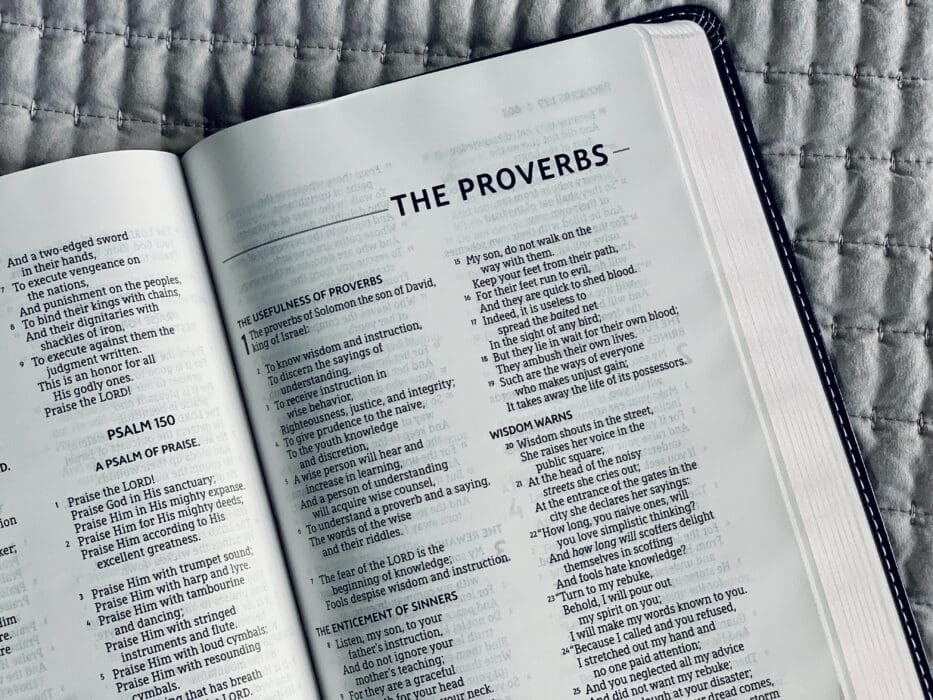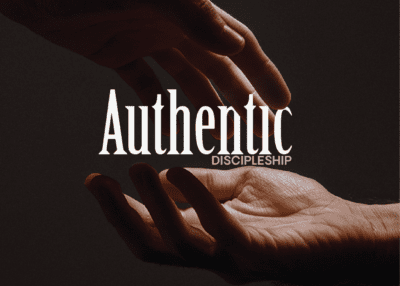Please open your Bible at Hebrews 11. We are looking at this marvelous chapter that was written to strengthen believers in face of unrelenting pressure. You have need of endurance (Heb 10:36). And faith is what will enable you to endure.
Then comes this marvelous exposition of faith. It begins with a definition: Faith is the assurance of things hoped for, the conviction of things not seen (Heb 11:1).
How can we be sure of things that we hope for? Things that don’t yet exist like redeemed bodies, a spotless church and a perfect world?
The answer is that these are the things God has promised, and faith trusts what God has promised. Then we are told that faith is the conviction of things not seen (Heb 11:1).
How can we be convinced of things we cannot see? Things that are invisible, like God – in sovereign control of all that happens in our lives and in our world. Jesus – exalted at the right hand of the Father. Us – forgiven, loved and destined for heaven, in Christ.
The answer is that these are things that God has revealed, and faith believes what God has revealed.
Faith believes what God has revealed and trusts what God has promised.
Faith is formed and fed by the Word of God. This is how it is the assurance of things hoped for, the conviction of things not seen.
This is really good news: God has given the same promises and the same revelation to all people. You can open the Bible and see for yourself what God has said and what God has done. These are written that you may believe that Jesus is the Christ…and that by believing you may have life in His name (Jn 20:31).
That is the foundation for our series. You have need of endurance. You will endure by faith. Faith believes what God has revealed and trusts what God has promised.
That’s what faith is. The rest of Hebrews 11 tells us what faith does. And here God teaches us by pointing to real-life examples of faith in action. What does it look like to walk, stand, and live by faith? The writer to Hebrews answers with a series of illustrations, and each of them highlights a distinct aspect of faith.
We begin today with the story of Abel, the first of ten models of faith we will learn from in this series and from his story we learn that faith listens to God.
By faith Abel offered to God a more acceptable sacrifice than Cain, through which he was commended as righteous, God commending him by accepting his gifts. And through his faith, though he died, he still speaks (Heb 11:4).
1. The Story (Genesis 4)
Here we have the story of two boys who grew up in the same believing family. They have the same parents, and are brought up in the same way. They come to the same altar, to worship the same God.
We are told that Abel was “a keeper of sheep” and Cain was “a worker of the ground” (Gen 4:2).
Both of these men brought offerings to the LORD. Cain brought…an offering of the fruit of the ground (Gen 4:3). Abel… brought of the firstborn of his flock (Gen 4:4). Here are two brothers. Both of them believe in God. Both of them come to worship God. Both of them offer something to God.
Then we come to the surprise in the story. One of the brothers is accepted by God. The other is not. And the Lord had regard for Abel and his offering, but for Cain and his offering he had no regard (Gen 4:4, 5).
How did they know that one offering was accepted and the other was not? We don’t know for sure, but there is an old tradition that fire came down from heaven and burned up Abel’s sacrifice. I think that may have been the case.
There are other places in the Old Testament where God showed His acceptance of a sacrifice by sending fire from heaven: Leviticus 9:24 tells us fire came out from before the LORD and consumed the burnt offering…and when all the people saw it, they shouted and fell on their faces (Lev 9:24).
The same thing happened when Elijah offered a sacrifice on Mt. Carmel, (see Jud 6:21, 13:19). If this was the case, you can imagine the scene: The first family arrives at the altar. Adam says, “Boys, this place is special. The altar is where God Himself comes near. Abel, you go first. Place your gift on the altar, offer your prayer, confess your sins, and then stand well back!”
Abel follows his father’s instruction: Then, suddenly, to his amazement, fire falls from the sky. It strikes the sacrifice like lightening and burns up the offering. Abel watches wide-eyed. God has heard his prayer. God has accepted his sacrifice. The smile of God is upon him.
Then Cain steps up to the altar: With great care, he arranges his fruit and vegetables on top of the stones. He offers his prayer, and then steps back in anticipation. But nothing happens. An hour later, Cain’s display of fruit and vegetables remains as it was, a gift offered, but evidently not received.
At this point we are told, Cain was very angry and his face fell (Gen 4:5). “Why does God put on a display of fireworks for Abel but not for me? What is so special about Abel and his offering?” The more Cain thought about it, the more angry he became.
That’s the story.
But what does it mean? What is its significance for us today? The answer is in Hebrews 11.
2. The Sacrifice
By faith Abel offered to God a more acceptable sacrifice than Cain, through which he was commended as righteous, God commending him by accepting his gifts (Heb 11:4).
Notice that the reason Abel was accepted and Cain was not, lay in the sacrifice. “By faith, Abel offered… a more acceptable sacrifice”.
Some writers focus on the way the sacrifice was brought. Two men brought their gifts to God. Abel had faith, so when he offered his lamb he was accepted by God. If Cain had offered his fruit and vegetables with faith, he would have been accepted by God too.
But Hebrews does not say that Abel offered a more acceptable faith. It says, “he offered a more acceptable sacrifice.”
And notice, Hebrews does not say that God commended him as righteous by accepting his faith. It says that God commended him “by accepting his gifts.”
The story here is not about a better brother. It is about a better sacrifice. It wasn’t Abel’s faith that made him right with God. It was the sacrifice that made Him right with God. How did Abel know what to bring? It seems clear that God had revealed this.
Hebrews tells us that, “by faith Abel offered to God a more acceptable sacrifice than Cain.” We saw last time that faith believes what God has revealed, and trusts what God has promised.
It follows that if Abel brought his sacrifice by faith, God must have revealed the sacrifice He wanted the brothers to bring.
Abel wasn’t guessing when he offered the lamb from the flock. He didn’t say “Now what shall I offer God?” I wonder what would happen if I sacrificed a lamb and sprinkled its blood on the altar? Maybe I should try that?
No. Hebrews tells us that Abel offered the sacrificed lamb by faith. And faith believes what God has revealed and trusts what God has promised.
One writer, John Brown, says, “Faith throughout the whole of the chapter is the belief of a divine revelation. It is plain then that a revelation had been made both to Cain and Abel respecting the duty of offering sacrifice, and the acceptable method of performing that duty.”
Is there any evidence that God had revealed what these men should offer? Yes, there is.
On the day Adam and Eve sinned, Scripture tells us that, The Lord God made for Adam and his wife garments of skins and clothed them (Gen 3:21).
Where did the skins come from? You can’t make a garment of skins without the death of an animal. I believe that the first sacrifice was made on the day that the first sin was committed.
Again, I quote John Brown: “We read that God clothed our first parents with the skins of animals and by far the most probable account of this matter is, that these were the skins of animals which He had commanded them to offer in sacrifice.”
I’m convinced that was the case, and here’s why. God had said to Adam and Eve, of the tree of the knowledge of good and evil you shall not eat, for in the day that you eat of it you shall surely die (Gen 2:17).
Then Satan came into the garden. Eve told him what God had said, but the enemy said, You shall not surely die (Gen 3:4). Now who was telling the truth? Who was to be trusted? God said, “in the day you eat of it (the tree) you shall surely die.”
Death did come to the Garden that day, but in the mercy of God, it did not come to Eve or to Adam directly. A lamb died in their place that day. Another life was laid down as a substitute for theirs.
God’s way of making sinners right with Himself through a life laid down as a sacrifice in our place goes all the way back to the Garden of Eden. If God had revealed this to Adam and Eve, you can be sure that they taught it to their children.
Imagine Adam and Eve talking with their boys after another day of back-breaking work in the fields.
“Boys, the world was not always like this. There was a time when your mom and I enjoyed a life you have never known in a place you have never seen. The God who made us filled our lives with good gifts in a perfect world, and at the end of the day God would appear to us and walk with us in the Garden.”
“You and mom saw God?” “Yes, we did. But then we were tempted. God had given us a command for our own protection, and we broke it. After that we hid from God, but He found us and when He did, I thought we were done for. But God is full of mercy. And, on that day we learned that another life would be laid down for us.”
Cain and Abel knew what God had revealed in the Garden. Abel believed the revelation. He knew himself to be a sinner and he trusted in the provision that God has made. By faith he offered the acceptable sacrifice.
But Cain did not believe what God had revealed. He acknowledged God as the author of the good gifts he enjoyed in his harvest. But he did not believe that he was a sinner. He did not see the need for a sacrifice.
Applications
1. Faith Listens to God
By faith Abel offered to God a more acceptable sacrifice than Cain. Cain would tell you that he had faith.
If you said to him, “Cain, you need to have faith like your brother, Abel,” He would have said “What do you mean? I have a strong faith! I believe in God. I go to worship…My faith is very important to me! I a farmer and I know that God makes things grow. God makes the sun to shine and the rain to fall. That’s why, when I bring in my harvest, I bring my offering to God. What do you mean I need to have faith?”
Cain believed in God. He believed that the good things in his life were gifts from God’s hand but he did not listen to what God said. He did not believe what God had revealed. He did not trust what God had promised.
This comes out clearly when God speaks directly to Cain. The LORD said to Cain, “Why are you angry, and why has your face fallen?” (Gen 4:6).
Cain heard the audible voice of God Himself, just as Saul of Tarsus heard the voice of the risen Lord Jesus Christ on the road to Damascus. God identified Cain’s opportunity. If you do well, will you not be accepted? (Gen 4:7). Cain had an open invitation to come to God in the way that God had appointed.
“Cain, you too can be accepted. You too can be commended as righteous. But you must come to God in the way that He has revealed. And that is on the basis of a life that is laid down as a sacrifice for you.”
God identified Cain’s problem.
And if you do not do well, sin is crouching at the door (Gen 4:7).
This is the first time the word ‘sin’ is used in the Bible. What is sin? “Cain, you know how you light a fire at night to keep wild animals away? Sin is like a wild animal that can destroy you, and if you will not believe what God has revealed and trust what God has promised, sin will overpower you.”
But Cain does not listen to God.
Every time God speaks, this man has a rebuttal. Until in Genesis 4:16 we read, Cain went away from the presence of the Lord.
Cain is the father of those who claim to have faith but do not believe what God has revealed. You will have met people like this. They will talk a great deal about God and about faith, but they will not listen to Scripture. But faith listens to what God has said. It is formed and fed by the Word of God.
Are you listening to God when He tells you in Scripture, that sin is crouching at your door, looking to destroy you? Do you see your need of His strength and His Spirit to overcome it this week?
Are you listening to God when He tells you in Scripture, that the way to be commended as righteous before God is through the life of another being laid down for you, and that God Himself provided this sacrifice when He came into the world in the person of Jesus?
Are you listening to God when He tells you in Scripture, that the sacrifice for sin has been made once for all and that it is sufficient to cover all of your guilt and all of your shame, so that today, you can be commended as righteous by faith in the Lord Jesus Christ?
Faith is formed and fed by the Word of God. Your faith will grow as you read the Scripture, and as you let your mind and heart be shaped by what God has said.
2. Faith Can Never Be Silenced
And through his faith, though he died, he still speaks (Heb 11:4). Faith provokes the world’s anger. And what we have in this story is the world’s first attempt to silence the voice of faith.
Cain had brought an impressive gift to God. He believes in God. He comes to worship. He brings a gift.
Surely, God will be pleased with this man?
But for Cain and his offering he [the Lord] had no regard (Gen 4:5).
It wasn’t that Cain’s offering fell short. It didn’t even get God’s attention. And when Cain saw this he was angry. “How dare God disregard me and what I have done!” What we really feel towards God will be revealed when He doesn’t give us what we want.
Cain’s anger was directed towards God, but he took it out on his believing brother.
I can picture Abel trying to win his brother:
Abel: “Brother Cain, it breaks my heart to see you like this. If you bring the sacrifice God requires, God will commend you as righteous.”
Cain: “Who do you think you are trying to tell me what to bring? You must think you are the voice of God!”
Abel: “No! I’m just telling you what God has said.”
Cain: “You’re always trying to make out that you are better than me”
Abel: “No That’s not it, Cain. I just wish you would listen to what God has said!”
But Cain would not listen. Over time his anger increased, and then we are told, Cain spoke to Abel his brother. And when they were in the field, Cain rose up against his brother Abel and killed him (Gen 4:8).
Cain was determined that the voice of faith should be silenced. But here’s from the learn from the story:
The voice of faith can never be silenced.
Hebrews tells us that Abel still speaks: And through his faith, though he died, he still speaks (Heb 11:4).
Abel speaks across the centuries, and is an abiding witness to the faith that listens to what God has said and trusts in the sacrifice He has revealed.
Martin Luther says of Abel, “He who when he was … alive could not teach even his only brother by his faith and example, now that he is dead teaches the whole world.”[1]
3. Faith Rests In Christ And What He Has Accomplished
By faith Abel offered to God a more acceptable sacrifice than Cain, through which he was commended as righteous. This story, like every story in the Bible, points us to Jesus Christ.
What does it take for a person to be commended as righteous before a holy God? A life must be laid down in sacrifice.
Abel’s sacrifice of a lamb from the flock points forward to Jesus, the Lamb of God who takes away the sin of the world (Jn 1:29). God presented Jesus as the sacrifice for our sins (Rom 3:25, 1 Jn 2:2).
He was led like a lamb to the slaughter (Isa 53:7). Our sins were laid on Him and He died in our place.
And God demonstrated that Jesus is the “acceptable sacrifice,” not by sending fire from heaven, But by raising Him from the dead!
And now, through Jesus Christ, and what He accomplished on the cross, all who believe are commended as righteous before God.
Prayer
Father we thank you for the Lord Jesus Christ, the acceptable sacrifice. Thank You that because of Him and what He accomplished on the cross, you will commend all who believe as righteous.
Save us from the self-will that resists what you have revealed. Help us to grow in the faith that listen to and is shaped by your Word. Grant that the voice of faith may never be silenced. And help us to find rest in Your Son and in all that He has accomplished. Through Jesus Christ our Lord. Amen.
—
[1] Cited in P.E Hughes, Hebrews.
[elementor-template id=”128476″]






